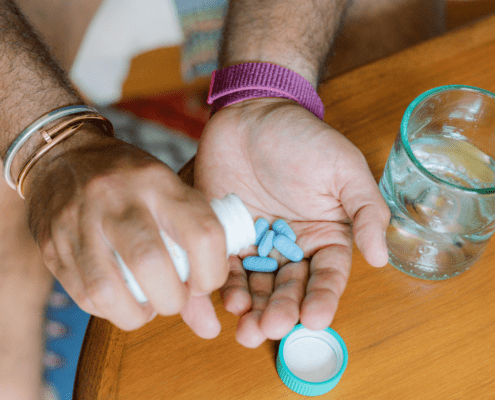
Sex is important and you should feel comfortable having the sex you want, with consent between those involved.
As with many forms of direct contact, there is a risk of an infection being passed between people when they have sex. These are called Sexually Transmitted Infections (STIs) or sometimes Sexually Transmitted Diseases (STDs).
There are a number of STIs, most of which are treatable or preventable if you know about them. Some can affect you for a long time but for the most part, in the developed world, they no longer pose a direct threat to your life, as long as you’re receiving treatment.

Fortunately, all it takes is some knowledge, good communication between partners and a regular sexual health check to be able to put your mind at ease.
Important to remember: STIs can be scary or embarrassing, but most of them are either commonplace, harmless, or easily treated. The most important thing we can do as a community is talk about them, and become familiar with our health care providers – nurses, doctors, or pharmacists. These people have seen and heard it all. If you feel you are not being listened to, go and get a second opinion.
Safer Sex
Many STIs have no obvious symptoms, so you may not know you have them. That’s why it’s best to have regular check-ups.
Sometimes, though, you may have some clear symptoms, such as an unusual liquid coming from your penis, pain in your penis when you urinate, or a swelling or pain somewhere in your testicles. If so, go see the clinic and talk to them!
If you think you might have an STI, it’s best to stop having sex with other people until you have it checked. At the very least, it’s the right thing to do to let your partners know.
Some people get embarrassed by the idea of having an STI and may not tell you because they’re afraid you may judge them, or find them less appealing. Other people may just be selfish. It’s best not to assume that someone has been checked recently. You really can’t guess someone else’s STI status, so either ask them, or maybe start a conversation about it by talking about when you were last checked. If someone refuses to say, that might be a red flag, and you may want to take precautions.
The infection many guys worry about is HIV. For many years, becoming HIV positive would severely restrict your life, but modern treatments now mean that the lives of people with HIV can be as happy, healthy and long as anyone who is HIV negative. What’s more, treatments for HIV can reduce the virus in the person’s blood to such a low level that it’s undetectable, and this means they cannot transmit HIV to anyone else. This is called “Undetectable = Untransmissible” or U=U.
You cannot tell if someone has HIV by looking at them. As always, the key thing is to communicate and be informed.
A condom is a physical barrier between a penis and another hole (like a mouth, an anus, or a front hole). They can be made out of latex, rubber or a synthetic material. They also come in different sizes (which is really important).
Because they’re a physical barrier, they serve to literally block the movement of fluids from one person to another (like semen into an anus, for example). That means that bacteria and viruses can’t get through – as long as the condom is used correctly.
Some common mistakes with condoms include using the wrong size (which can be painful if it’s too small, may not cover all of your penis if you have a long penis, or may fall off during sex if it’s too loose), damaging the condom when you take it out of the package, storing them incorrectly, or not putting them on correctly.
Practice makes perfect! Grab a couple from the local clinic (they usually give them out for free) and explore what works for you. Figure out how to put one on before you meet someone.
Because condoms protect against a range of STIs, they are considered one of the best general purpose protections against infection.
There is now a daily medication that you can take which can prevent you getting HIV if you are HIV negative and being monitored correctly. PrEP is a daily pill containing a medication like Truvada or Discovy, although there are others in development. There are different ways of using them: some people take them every day, others only take them before they go out for some fun. You can talk to your local sexual health clinic about PrEP. Some people can’t easily take PrEP for genetic reasons, so it’s important to use it with the guidance of a medical professional. (more info on PrEP).
If someone is HIV positive and is taking medication to treat it, then the level of HIV viruses in their blood can drop to basically zero. This is called an undetectable HIV load. The person still has HIV, and if they stop taking medication the virus will come back.
If an HIV positive person is undetectable and on medication, they cannot transmit HIV to anyone else. This has been studied in hundreds of thousands of couples, and is now a well established medical fact. (more info on TasP).
Some people might tell you that they’re using TasP for prevention, which means that they’re monitored by a clinical team, they’re on their medications, and they cannot transmit HIV. Communication is key!
Masturbation (sometimes called ‘mutual masturbation’ if you’re masturbating with a sexual partner) is generally regarded as one of the safest sexual activities.
Because you’re not putting any bodily fluids inside someone else, then the risk is pretty low for most STIs. However, once someone has climaxed and there is cum present, that cum can be a way for STIs to get transmitted, if he has any. If you’re worried about infection, simply wiping up the cum is an effective way to mitigate the risk.
In 2021, there was an outbreak of monkeypox – a virus that’s passed from person to person by contact, like rubbing against a person. Masturbation and frottage (rubbing yourself against another person sexually) is considered a good way for monkeypox to be transmitted. There’s a safe, effective, and long-lasting vaccine for monkeypox, and we recommend you talk to your local clinic about getting it.
For our purposes here, when we say ‘fucking’ we mean penetrative sex where a penis is being put inside someone anywhere except a mouth. In general, this is considered ‘high risk’ for STIs because a lot of bodily fluid is being passed from one person to another.
One way of making fucking safer is to use a condom, which provides very good protection against most STIs. ‘Barebacking’ or ‘bb’ is a common term for fucking without a condom, which is considered high risk. Using lubricant and taking PrEP are ways of reducing the risk from barebacking. Some people are willing to accept the risk but try to lessen it by pulling their penis out of their partner before cumming. This does reduce the risk, but not to zero.
Oral sex means using your mouth to contact someone’s genitals or bodily fluids (like cum). In general, it’s safer than fucking because your mouth is naturally good at stopping a lot of viruses and bacteria. It can still pose a risk if you have any cuts, abrasions, burns or irritation in your mouth or teeth.
Condoms can still be used for oral sex, as can a dental dam (basically a sheet of latex or rubber which you can put over a hole like an anus). Like the advice for condoms, these only work if they are used correctly, so you should play around with them to find out what works for you and your partner.
You shouldn’t engage in oral sex with your mouth if you have any cuts, or have brushed your teeth in the last hour or so (this can create small cuts in your gums). It’s also recommended that you don’t use mouthwash for a while before oral sex, as this can also irritate your mouth.
Sexually Transmitted Infections (STIs)
There are different types of hepatitis. All of them affect your liver and can have serious health consequences or even be fatal. In general, the two you will hear most about are Hepatitis A and Hepatitis B. People might not know they have Hepatitis, and like with HIV, you cannot tell by looking at someone, unless the infection has become serious.
Hepatitis A is normally contracted from feces (poop), so gay men can get it from rimming (using your tongue or mouth on another guy’s anus), although if people are not careful with their food preparation, it can be passed on that way too.
Hepatitis B is normally transmitted sexually, or from using contaminated needles (whether for medical uses or drugs).
There are great vaccines for Hepatitis A and B, and they can be obtained either separately or together in a combined vaccine. Talk to your doctor or a local clinic. In many areas, the vaccine is free.
Hepatitis C doesn’t have a vaccine, but there are pharmaceutical treatments that are normally able to clear the infection. As with Hepatitis A and B, have a chat with someone at your doctor’s office, or sexual health clinic. A blood test will tell them if you have been vaccinated, or if you have been exposed to any of the hepatitis viruses.
Condoms are a great way to protect yourself from Hepatitis.
Syphilis is a bacterial infection and has been with humankind for as long as we have existed. It is transmitted sexually, but it can also be passed from a mother to her baby during birth. Most people will notice a lesion or sore at the site of the infection (normally a penis, vagina, anus, but it can appear in other places) about 2-6 weeks after they have been infected. This may be itchy or irritating, but not always. Either way, any time you get a new sore on your genitals, or elsewhere, that you think may be connected with your sexual activity, see your doctor or sexual health clinic.
Syphilis can be treated and cleared with antibiotics through injections that have to be administered by a doctor or nurse. It’s much easier to treat if you get it early. Millions of people get infected with syphilis each year worldwide, so don’t hesitate to see a clinic if you think there may be an issue. They’ll do a blood test for it, which can take a few days to process.
If you don’t get syphilis treated, it can progress to a much more serious disease, so it’s best to get it checked as soon as possible.
Gonorrhea (or the clap) is a bacterial infection which often causes pain when people with a penis urinate (although not everyone experiences this symptom). For people without a penis, roughly half of those with gonorrhea do not experience any symptoms at all. Some people experience a white discharge from their genitals from gonorrhea, but again, many may not. For people with a uterus, if left untreated, there is a lot of evidence that it can cause serious complications with menstruation, or pregnancy.
Gonorrhea can normally be easily treated with antibiotics, although some strains of it can be tougher to get rid of.
If you experience pain while you urinate, or an unusual discharge from your genitals, you should see your doctor or a sexual health clinic. They’ll normally do a simple urine test, although some cases might need other testing.
Chlamydia is a bacteria which is almost exclusively transmitted via sexual contact. For people with a cervix, 70% will not show any symptoms, while 50% of people with a penis will have symptoms. Generally, the symptoms are similar to gonorrhea – pain while urinating or an unusual discharge.
Chlamydia is one of the most common sexually transmitted infections, transmitted via vaginal, anal, or oral sex, and can affect the throat, anus and even the eyes. In cases where it makes it to your eyes, it can sometimes cause serious problems.
There is a good treatment for chlamydia, and most sexual health clinics can give you a simple urine test and the medicine needed.
Herpes is a viral infection caused by a virus called HSV (Herpes Simplex Virus). It often causes blisters on the skin around your mouth or lip or on your genitals. Once the blisters have passed, the virus stays with you, and can reappear sometimes (often when you get sick, or if you are stressed in some way). If the blisters are around your mouth, they can sometimes be called cold-sores, or fever blisters. Around your genitals or anus, they are normally called genital herpes.
Normally, people are most likely to transmit the infection when they have the blisters present, or just before they emerge. Some people feel an itchy or burning sensation just before the blisters, while other people may not know they are there at all.
Herpes cannot be cured: once you have the virus, it is with you for life. But it’s important to know how common it is: around 70% of the world’s population carry some sort of HSV!
There are treatments that can help with HSV – either to try to prevent an outbreak of the blisters, or to help make them heal faster. Check in with a doctor or your sexual health clinic for some details.
Genital warts are an infection caused by the HPV virus (Human Papilloma Virus), and they sometimes cause a small skin tag or ‘wart’ to form. They can be spread during most sexual activities.
If you find a raised bump around your genitals or your anus, the good news is that they can be treated by your doctor or your local sexual health clinic. What’s more, there’s a vaccine against some of the HPV viruses, which can help prevent you getting them. Sometimes, they’ll pass on their own, although it’s always a good idea to get them checked out.
One important thing to know about HPV is that it has been associated with increased risk of cancer in some people. Particularly in cervical, anal and throat cancers, there are some signs that HPV can be a major risk for later cancer development. For this reason, the vaccine is recommended in many areas and is often provided free of charge by a public health agency. Talk to your doctor or sexual health clinic to find out more.
Pubic lice (sometimes known as crabs) are small insects that are normally between 1-3mm long. They are passed between people by physical contact, or via close contact (such as sharing a bed, or a towel). Generally the first signs will be itching around your groin (particularly where you may have pubic hair). For people with facial hair, there are some rare occasions where they will be found there too.
They can normally be spotted with a close examination of any area where there is hair (the lice tend to cling to hairs to stay in place).
Lice themselves do not cause any serious issues, beyond being embarrassing and irritating. However, itching and scratching the area can often break the skin. Treatment of lice is simple – visit your doctor, local pharmacy or drug store and they’ll give you a medicated shampoo or cream, along with other instructions (normally to wash all your clothes and bedding to ensure that they’ve been killed off).
